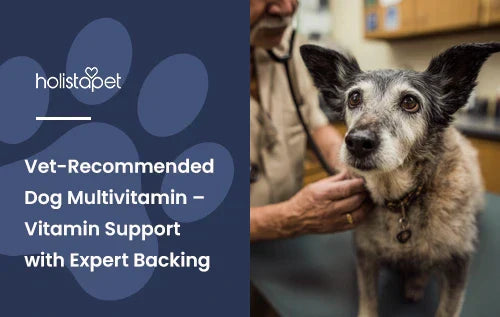"Can I give my dog vitamin C for humans?" Many pet owners have thought this when they peek at their own vitamin stash. Canines are unique, though, and their bodies don’t work exactly like ours.
Ascorbic acid is an essential nutrient for humans, but dogs synthesize it naturally. Still, under certain health conditions or stressful times, supplemental vitamin C can help. Let's talk about what's safe, what's risky, and what truly benefits your pup.
What Is Vitamin C & What Does It Do in Dogs

Vitamin C, also called ascorbic acid, is an essential nutrient that helps a dog's body stay strong. Unlike humans, healthy pups can synthesize vitamin C in their livers.
This vitamin supports immune function by enhancing the production and activity of white blood cells. It also acts as a powerful antioxidant, helping to protect body tissues from damage. On top of that, vitamin C supports collagen production, which keeps connective tissue strong.
Sources of Vitamin C for Dogs
Dogs can get vitamin C in more ways than one. Their bodies naturally synthesize this nutrient, which means many healthy dogs already produce enough for their daily needs. Still, there are times when extra support is necessary.
Fresh foods provide another source of vitamin C for dogs. Bell peppers, broccoli, and certain fruits contain it, though not all are safe for pets. Commercial dog foods may also include additional vitamin C. Dog vitamin supplements are another option.
Naturally Produced vs. Dietary Needs
Dogs are different from humans because their bodies can synthesize vitamin C on their own. A healthy dog's liver creates this vitamin daily, and this usually covers most of their nutritional needs.
But some dogs may need additional vitamin C. Stress, illness, or aging can place extra demand on their body, leaving natural production lower than needed. In these cases, dietary supplementation through wellness products or fortified dog food may help.
Dog-Specific Supplements
Dog-specific vitamin C supplements are specially made with pets in mind. These products often use calcium ascorbate or sodium ascorbate, which are gentle forms of vitamin C. They may come as chewable treats, powders, or soft chews.
Unlike supplements for humans, pet formulas avoid risky additives or sweeteners. They also list dosage amounts based on a dog's weight and life stage. Supplemental vitamin C in dog products supports health, all while keeping safety in focus.
Human Vitamin C Products
Human vitamin C supplements are easy to find, but not every type suits dogs. Tablets, powders, and gummies often contain additives like sweeteners or flavorings. These may cause digestive upset or irritation in canine pets. Even small amounts of these extras can be rough on their body.
If a pet owner does consider human vitamin C, plain versions are the safest option. Also, dosing is crucial. Too much vitamin C may lead to queasiness or bladder issues. Before adding human supplements to a pet's diet, checking with a trusted vet is always the safer move.
Risks of Giving a Dog Human Vitamin C
Giving dogs human vitamin C can carry risks if not handled carefully. High doses may overwhelm the digestive system. This can then lead to stomach troubles, loose stool, or irritation. Some pups also develop bladder stones when excess vitamin C breaks down into oxalates.
Another concern is what human products contain besides the vitamin itself. Gummies and flavored tablets often include sugar, xylitol, or artificial dyes. These additives may be harmful, even in small amounts. For that reason, pet owners should stick to options designed for dogs whenever possible.
When Dogs Might Need Extra Vitamin C
Most healthy dogs synthesize vitamin C without help, but some situations call for extra support. Supplemental vitamin C can give a boost when life puts added stress on a dog's body. Here are some special cases:
- Seniors, Puppies, or Dogs Under Stress. Growth, aging, and worry can increase nutrient demand.
- During Recovery from Illness or Surgery. Healing tissues may need more vitamin C.
- Dogs With Limited or Restrictive Diets. Extra nutrients help fill the gaps.
- Active or Working Dogs. Service, hunting, or agility dogs burn through resources faster.
- Pregnant or Nursing Dogs. Supporting mom and pups requires more.
- Dogs With Chronic Allergies. Adding antioxidants may help balance the immune system.
HolistaPet Joint Support Soft Chews — Includes Vitamin C

HolistaPet Joint Support Soft Chews pack more than just a tasty bite. Each piece includes 75 mg of vitamin C, giving dogs a boost in a safe and measured way. This helps support collagen creation, immune function, and joint comfort.
Alongside vitamin C, the formula blends glucosamine, MSM, chondroitin, and turmeric. These ingredients work together to support mobility and help ease everyday aches. Plus, soft chews are simple to give, even for picky pups. Trust them to fit easily into any dog's diet.
Safe Dosage Ranges & How To Administer Vitamin C
The right dose of vitamin C depends on a dog's size, age, and health status. Small pups may only need a modest amount. Larger breeds can usually handle more. Older dogs or those with certain health conditions may also benefit from careful vitamin C supplementation. Many veterinarians suggest daily intake levels of around 30–50 mg for small breeds, 100–200 mg for medium breeds, and up to 500 mg for large breeds.
Pet parents can give vitamin C through soft chews, flavored powders, or plain tablets. Dog-specific products are easiest since they're labeled by weight. When using human vitamin C, plain ones work best, but you must reduce the dosage. Always follow safety guidelines and, most importantly, speak to your vet.
When To Avoid Giving Extra Vitamin C
Extra vitamin C isn't right for every dog. Some pups with kidney disease or urinary tract issues may struggle with added amounts. In these cases, supplemental vitamin C can increase the chance of calcium oxalate stones forming in the bladder.
Dogs already eating commercial dog foods with additional vitamin C may not need more. High doses can cause queasiness, digestive upset, or irritation. Owners who notice unwanted changes in their dog's health after adding vitamin supplements should stop and check with a veterinarian before continuing.
FAQs – Dogs & Human Vitamin C Use
Every dog has different nutritional needs. By learning more about vitamin C supplementation, owners can make smarter choices to support their dog's immune system, joint health, and overall wellness. To find out more about this helpful nutrient, keep reading.
Can dogs safely take human vitamin C supplements?
Dogs can sometimes take human vitamin C supplements. Safety depends on the product and the dosage. Plain vitamin C in tablet form is usually safer than gummies or flavored powders. That's because the latter options often contain sugar or harmful additives.
Still, human supplements are not tailored to a dog's nutritional needs. A pup's body may react differently, and too much vitamin C can upset digestion. For that reason, pet parents should rely on products made for dogs whenever possible. They're formulated with the right dosage and free from risky extras.
How much extra vitamin C is too much?
The right dosage depends on weight and health status. But as a general guideline, many small animal practice vets suggest keeping daily intake around 30–50 mg for small dogs, 100–200 mg for medium dogs, and up to 500 mg for large breeds.
Going above these ranges raises the chance of side effects. Too much vitamin C can upset a dog's digestive health. Large doses often lead to queasiness, loose stool, or stomach irritation. In some cases, excess vitamin C breaks down into oxalates, which may form stones in the bladder. For safe results, stick to dog-specific products with measured doses and check with a vet before adding extra vitamin C.
Will vitamin C help my dog's joints or skin?
Vitamin C supports collagen production, which strengthens connective tissue. This makes it useful for joint health, especially in older dogs or pups with hip dysplasia. Added vitamin C may also work with other ingredients like glucosamine and chondroitin to keep joints flexible and comfortable.
For skin, vitamin C's antioxidant properties can help protect body tissues from damage. Some dogs with rashes or skin blemishes may benefit from extra support in their diet. While it's not a cure-all, supplemental vitamin C can aid both joints and skin as part of a balanced wellness routine.
Are human vitamin C products flavored or sweetened dangerously?
Many human vitamin C supplements come in chewable or gummy form. These often contain sweeteners, flavorings, or dyes that may upset a dog's stomach. Some even include xylitol, which is highly toxic to canines, even in tiny amounts.
Plain ascorbic acid tablets or powders are less risky, but they still aren't made with pets in mind. That's why dog-specific vitamin products are the safer choice. They deliver the right dosage without harmful extras. Pet parents should always check labels before adding any human vitamin supplements to their dog's diet.
Final Thoughts – Can Dogs Take Human Vitamin C?
Dogs can sometimes take human vitamin C, but it's not always the best option. Their bodies already synthesize this vitamin, and too much can cause stomach troubles or bladder stones. Human products also carry risks if they include sweeteners or additives.
For safe support, dog-specific wellness products work best. HolistaPet's Joint Support Soft Chews, for example, provide a measured dose of ascorbic acid along with joint-friendly ingredients like glucosamine and turmeric.
Choosing tailored products keeps everyday wellness simple, safe, and effective. With the right approach, vitamin C can be a helpful boost for your furry bestie's health.


 CBD Oil for Dogs - Fast Acting
CBD Oil for Dogs - Fast Acting
 Chicken Flavored CBD Oil For Dogs - Easy Dose
Chicken Flavored CBD Oil For Dogs - Easy Dose
 Salmon Flavored CBD Oil For Dogs - Highly Rated
Salmon Flavored CBD Oil For Dogs - Highly Rated
 CBG Oil for Dogs and Cats - Loved by Thousands
CBG Oil for Dogs and Cats - Loved by Thousands





Leave a comment
All comments are moderated before being published.
This site is protected by hCaptcha and the hCaptcha Privacy Policy and Terms of Service apply.